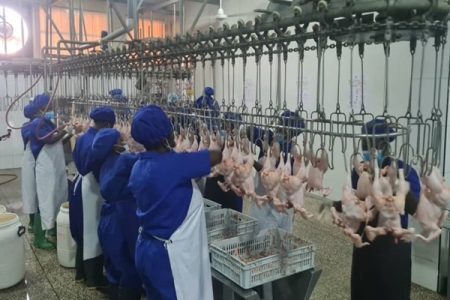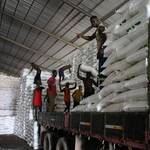The West Africa Food System Resilience Programme (FSRP) has reported excellent initial results from its poultry project, with high demand for further support.
Project Coordinator Mr. Osei Owusu Agyeman shared insights into the progress made by the project, which involves the rearing of broiler poultry ready for processing and marketing.
Successful first batch
The first batch of broiler poultry, consisting of about 160,000 day-old chicks and 4.5 kilogrammes of feed per bird, along with vaccine supplies, has reached maturity.
The broilers, now seven weeks old with an average live weight of 2.9 to 3 kilogrammes, are ready for processing into whole chickens and cut parts.
These products are set for packaging and marketing, meeting the demand for dressed chicken from fast-food restaurants, which typically prefer weights between 1.1 and 1.3 kilograms.
Quality assurance and processing
Mr. Agyeman said officials from the Ministry of Food and Agriculture (MoFA) and FSRP visited several processing facilities, including Rockland Farms, Asamoah and Yamoah Farms, Darko Farms, and Boris B Farms, to ensure adherence to industry standards such as feed quality, vaccinations, bio-security, and general bird health.
Rockland Farms showcased semi-automated processing methods, while Darko Farms and Asamoah & Yamoah Farms demonstrated fully automated processes including slaughtering, dressing, cutting, packaging, blast freezing, and transportation.
22 farmers selected
Mr. Agyeman said that the project initially selected 22 farmers across six regions, providing feed and helping them identify markets.
This input credit system allows farmers to pay for supplies after production, enhancing competitiveness and resilience.
Expansion to other regions
The FSRP Poultry Intensification Scheme started from the Eastern Region (with Fredna Farms), the Central Region (with Judahson Farms), and the Greater Accra Region (with Pap Farms).
Anchor farmers in the Bono and other regions are expected to join the scheme next month.
Mr. Agyeman pointed out that the poultry component is crucial due to the high market demand.
Sustainability and private sector engagement
The project is anchored on three themes: sustainability, ownership, and public-private engagement.
FSRP aims to ensure that every activity is sustainable and accountable, involving the private sector as investors, clients, or partners.
Mr. Agyeman said the private sector’s readiness to partner with FSRP is promising, with established markets and export orders already secured.
He noted that local markets also appreciate the fresher, better-quality products.
Direct approach and youth engagement
He explained that FSRP’s direct dealings with suppliers save time and interest costs compared to bank loans, making agriculture an attractive option for young entrepreneurs.
He noted that the programme’s goal is to de-risk the poultry sector by ensuring resilience and supporting efficient, productive businesses.
Mr. Agyeman explained that the next steps involve expanding the initiative across regions, guaranteeing supply, and linking small outgrowers to major producers.
He said FSRP promises to ensure quality through adherence to Food and Drugs Authority (FDA) and veterinary standards.
Continuous education and insurance
He emphasized continuous education on hygiene and disease management is essential for resilience.
He disclosed that FSRP plans to partner with insurance companies to provide group insurance, making it more affordable for businesses.
According to him, by grouping and supporting these businesses, FSRP aims to make the poultry sector viable and resilient.
Commitment to economic growth
“Poultry is a real business, critical for our economy, and we are prepared to support it and the private sector for economic growth,” stated Mr. Agyeman.
He said the government’s role is to provide support while entrepreneurs drive resilience and survival, ensuring that private sector businesses in agriculture can withstand global challenges and drive the supply chain.
Deputy Director at the Animal Production Directorate of the Ministry of Food and Agriculture (MoFA), Dr. Abdul Razak Okine, said the first batch of birds from the FSRP poultry project has shown very promising results.
He highlighted the impressive progress from the time the beneficiaries received the chicks to the point where they began harvesting at six weeks.
He commended both the farmers for their efforts and the support provided by the FSRP in facilitating the process.
He noted that MoFA is closely monitoring the farmers’ activities within the larger framework of the ministry’s objectives.
Dr. Okine stated that the poultry component of the project is deemed crucial, with MoFA aiming for full self-sufficiency by 2028.
This goal aligns with the broader vision of ensuring that Ghanaians consume locally produced goods.
Future plans and objectives
In Ghana, FSRP, implemented by MoFA, focuses on the production, marketing, and consumption of rice, maize, broiler poultry, soybeans, and tomatoes.
The project, funded by the World Bank and promoted by ECOWAS, aims to strengthen food system risk management, improve agricultural sustainability, and harmonize markets in West Africa, including countries such as Burkina Faso, Ghana, Togo, Mali, Niger, Chad, Sierra Leone, and Senegal.

